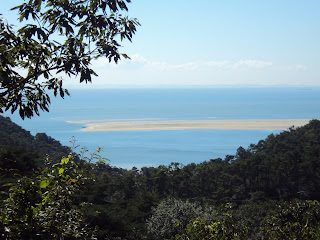
Irony, in a roundabout way. More concisely, loneliness. Our apartment is my much needed refuge from noise on the street, distraction and the last nine years of almost full-time work and schooling but there are moments when I take a break from my dedicated writing schedule and realise that between the hours of eight and five, I am quite alone. And while I use this loneliness to great creative advantage, eventually I feel my hunger for changeable environments gnaw at my belly. Note my hunger for environment, not company. So we left, I and twelve others, on the Rainbow Ferry bound for seclusion and relaxation. Upon hitting port we were driven ten minutes up mountain to a small collection of min-boks overlooking a chocolate sand tide. One of our fellows had brought her dog and we took him to the water where we ran, paddled and smoked until chips and dip lured us back to our personal patio. There I reconnected with foods I haven't seen let alone tasted for months; Camembert, Kettle chips and French Onion and salsa dips. The surrounding conversation was stimulating and as I noticed the minute differences in each person's behaviour, people I'd met only a few hours earlier, it came to me that these signs identified their own attempts at isolation. They were retreating from work, crowds, relationships and, like me, loneliness in a city. After the snacks were demolished we all floated apart like drunken moths but there was a beautiful sense of togetherness. Gone was the common stress I have encountered on many group holidays: that of interaction. During my quiet hour on an out-of-sight balcony I didn't feel I was letting anyone down for want of companionship. I could retreat with nothing to consider but my own reasons for being there. We each went to indulge personal motivations and when we crossed paths I had to smile at the comfort of this arrangement. Talk and humour, if desired, was in the next room or sitting at the edge of the surf, while undisturbed contemplation was easier to grab than a slightly warm rum and coke. We had created our own separate islands but they, so unlike the rigid rock walls we walked along that afternoon, were flexible and hungry for regular fellowship . And when darkness fell in with the ocean mist we let the distance between us shrink, our isolations satiated.

There was a second reason for my choice of holiday location, one that tipped the scales from our original plan of south-east Busan. The heat, the suffocating heat in Seoul, made me search out a place where I could experience cold for the first time in three months. Our morning of departure was foggy and wet and the further from land we travelled the cooler the breeze became until, joy of joys, I had to dig out a jumper. The island was equally chilled and while some of the group bemoaned the lack of sun I found a nest in the sand and offered my head to the drizzle. I seem to have lost my joy for beach swimming in recent years but the water was warm enough that I went in to my thighs and enjoyed my shivering shoulders and tingling feet. That night there was a deluge and we rigged open umbrellas between the gaps in the patio roof and sprinted from room to room for extra food and spirits. Drinking games aside we kept warm with blankets and huddling and long after East had gone to bed I stayed up just to feel my skin prickle with chill. Unfortunately, once inside I had to succumb to another form of Korean overheating: the ondol, turned up to such degrees that even if I could find the off switch I doubt it would have made any difference. Our final day was one of tragic contradiction made bearable by the continually amusing company. The skies cleared, heat rose and the view from the mountain top revealed itself to be one of exquisite beauty and I thought, oh yes another impressive piece of landscape. And while I thanked the powers above that gave me such incredible experiences, I couldn't judge my enjoyment based only on environment; I valued temperature. And to see the island sights the sun had to be out which meant one thing: Lara lost the ability to function. Which felt a tad unfair. But I suppose life is about give and take. I was given beauty and took the bother that came with it.

So what does all this mean for my future travelling plans? Am I discarding whole countries and cultures for fear of heat-induced bewilderment? Is it something I can ever accustom myself to, like spicy food or cigarettes? The real question is, do I want to. I say no. My weather preference isn't only part of me, it has built me. My very personality has been sculpted by a history of living in cold climate areas, so much so that I have come to believe heat has the power to change who I am and who I will be. This then impacts on how I view what is around me, whether it be crowds or emptiness. Perhaps more so in regards to isolation. I have trouble appreciating these quiet expanses if they come to me through heat and humidity. So what do I do? I tolerate; in fact, that is the perfect word – I don't like it but can accept there's nothing to be done. Still, there's always the chance to heap insult on injury. When we got back to Seoul it was hot. It was bloody hot.
 Lara tells lies. It's always about the puppies.
Lara tells lies. It's always about the puppies.







